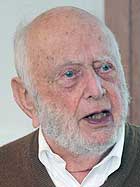Douglass C. North, Ph.D., the Spencer T. Olin Professor in Arts & Sciences, was fielding calls from around the world after this year’s winners of the Nobel Prize in economics were announced.
Friends, colleagues and reporters were seeking his comments on the newest laureates: Elinor Ostrom, Ph.D., the Arthur F. Bentley Professor of Political Science at Indiana University Bloomington; and Oliver Williamson, Ph.D., the Edgar F. Kaiser Professor Emeritus of Business, Economics and Law at the University of California, Berkeley.

North
North, a 1993 recipient of the Nobel in economics, could hardly contain his enthusiasm.
“(Ostrom and Williamson) are both good friends of mine,” North said. “They both pioneered what is now a rapidly expanding new institutional economics, which attempts to integrate not only institutions into economics but also integrate the social sciences and cognitive sciences in a more elaborate and complex framework of looking at how societies evolve over time.”
North and another Nobel laureate, economist Ronald Coase, Ph.D., are credited with founding the field of new institutional economics. North, a strong proponent of a multidiscipline approach to economics, is pleased that Ostrom is the first political scientist to receive the economics prize.
“Elinor has done pioneering work on volunteeristic organizations that evolve,” North said. “They don’t have a coercive authority behind them but face the problem of what we call ‘common property resource dilemmas,’ which means nobody owns them, and when nobody owns it, usually, we use it badly.
“What Elinor tried to show us is that there are all kinds of volunteeristic organizations that have evolved such as the lobster fishermen in Maine — which have been quite successful and effective,” North said.
Ostrom is the first woman to receive the economics prize.
Williamson was cited by the Nobel committee “for his analysis of economic governance, especially the boundaries of the firm.”
“Oliver Williamson has done pioneering work, following up on Ronald Coase’s work, attempting to explore the way in which institutional structures affect business organizations,” North said, “and how it has influenced the policy structure of business organizations and led to more productivity in the organization.”
North dismisses critics who say Ostrom and Williamson do not subscribe to the formal, mathematical model-based approach to economics. North disapproves of the direction economics has gone toward narrower and more specialized models.
“I’ve gone just the other way,” North said. “I don’t think you can make sense of the world without integrating economics with the other social sciences and cognitive science because we don’t live in an economic world. We live in a world that is an intermingling complex of all those things.”
North said the work of Ostrom and Williamson, like his own, is helping to understand the way societies evolve.
“We’re just beginning to do important work,” North said. “Both Elinor and Oliver are contributing to that work, and I’m delighted to see them get into the game.”